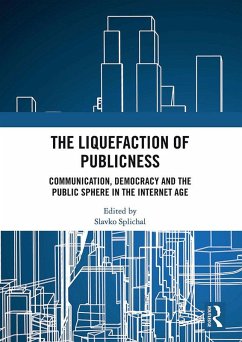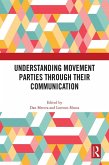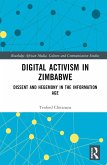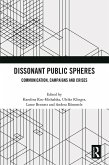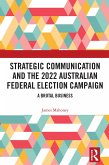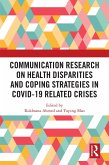The Liquefaction of Publicness (eBook, PDF)
Communication, Democracy and the Public Sphere in the Internet Age
Redaktion: Splichal, Slavko
40,95 €
40,95 €
inkl. MwSt.
Sofort per Download lieferbar

20 °P sammeln
40,95 €
Als Download kaufen

40,95 €
inkl. MwSt.
Sofort per Download lieferbar

20 °P sammeln
Jetzt verschenken
Alle Infos zum eBook verschenken
40,95 €
inkl. MwSt.
Sofort per Download lieferbar
Alle Infos zum eBook verschenken

20 °P sammeln
The Liquefaction of Publicness (eBook, PDF)
Communication, Democracy and the Public Sphere in the Internet Age
Redaktion: Splichal, Slavko
- Format: PDF
- Merkliste
- Auf die Merkliste
- Bewerten Bewerten
- Teilen
- Produkt teilen
- Produkterinnerung
- Produkterinnerung

Bitte loggen Sie sich zunächst in Ihr Kundenkonto ein oder registrieren Sie sich bei
bücher.de, um das eBook-Abo tolino select nutzen zu können.
Hier können Sie sich einloggen
Hier können Sie sich einloggen
Sie sind bereits eingeloggt. Klicken Sie auf 2. tolino select Abo, um fortzufahren.

Bitte loggen Sie sich zunächst in Ihr Kundenkonto ein oder registrieren Sie sich bei bücher.de, um das eBook-Abo tolino select nutzen zu können.
This book celebrates the 25th anniversary of the journal Javnost - The Public , bringing together topical discussions in contemporary media and communication research.
- Geräte: PC
- ohne Kopierschutz
- eBook Hilfe
- Größe: 4.94MB
Andere Kunden interessierten sich auch für
![Understanding Movement Parties Through their Communication (eBook, PDF) Understanding Movement Parties Through their Communication (eBook, PDF)]() Understanding Movement Parties Through their Communication (eBook, PDF)42,95 €
Understanding Movement Parties Through their Communication (eBook, PDF)42,95 €![The Liquefaction of Publicness (eBook, ePUB) The Liquefaction of Publicness (eBook, ePUB)]() The Liquefaction of Publicness (eBook, ePUB)40,95 €
The Liquefaction of Publicness (eBook, ePUB)40,95 €![Digital Activism in Zimbabwe (eBook, PDF) Digital Activism in Zimbabwe (eBook, PDF)]() Tenford ChitananaDigital Activism in Zimbabwe (eBook, PDF)42,95 €
Tenford ChitananaDigital Activism in Zimbabwe (eBook, PDF)42,95 €![Media Power and Hegemony in South Africa (eBook, PDF) Media Power and Hegemony in South Africa (eBook, PDF)]() Blessed NgwenyaMedia Power and Hegemony in South Africa (eBook, PDF)43,95 €
Blessed NgwenyaMedia Power and Hegemony in South Africa (eBook, PDF)43,95 €![Dissonant Public Spheres (eBook, PDF) Dissonant Public Spheres (eBook, PDF)]() Dissonant Public Spheres (eBook, PDF)52,95 €
Dissonant Public Spheres (eBook, PDF)52,95 €![Strategic Communication and the 2022 Australian Federal Election Campaign (eBook, PDF) Strategic Communication and the 2022 Australian Federal Election Campaign (eBook, PDF)]() James MahoneyStrategic Communication and the 2022 Australian Federal Election Campaign (eBook, PDF)42,95 €
James MahoneyStrategic Communication and the 2022 Australian Federal Election Campaign (eBook, PDF)42,95 €![Communication Research on Health Disparities and Coping Strategies in COVID-19 Related Crises (eBook, PDF) Communication Research on Health Disparities and Coping Strategies in COVID-19 Related Crises (eBook, PDF)]() Communication Research on Health Disparities and Coping Strategies in COVID-19 Related Crises (eBook, PDF)52,95 €
Communication Research on Health Disparities and Coping Strategies in COVID-19 Related Crises (eBook, PDF)52,95 €-
-
-
This book celebrates the 25th anniversary of the journal Javnost - The Public, bringing together topical discussions in contemporary media and communication research.
Dieser Download kann aus rechtlichen Gründen nur mit Rechnungsadresse in A, B, BG, CY, CZ, D, DK, EW, E, FIN, F, GR, HR, H, IRL, I, LT, L, LR, M, NL, PL, P, R, S, SLO, SK ausgeliefert werden.
Produktdetails
- Produktdetails
- Verlag: Taylor & Francis eBooks
- Seitenzahl: 286
- Erscheinungstermin: 28. April 2020
- Englisch
- ISBN-13: 9780429833137
- Artikelnr.: 58782524
- Verlag: Taylor & Francis eBooks
- Seitenzahl: 286
- Erscheinungstermin: 28. April 2020
- Englisch
- ISBN-13: 9780429833137
- Artikelnr.: 58782524
- Herstellerkennzeichnung Die Herstellerinformationen sind derzeit nicht verfügbar.
Slavko Splichal is Professor of Communication and Public Opinion in the Faculty of Social Sciences at the University of Ljubljana, Slovenia and a fellow of the Slovenian Academy of Sciences and Arts, Ljubljana, Slovenia. He is Founder and Director of the European Institute for Communication and Culture and Editor of its journal Javnost - The Public.
Part I: Publicness and the Public Sphere in the Internet Age 1.
Publicness-Privateness: The Liquefaction of "The Great Dichotomy" 2.
Debunking Deference: The Delusions of Unmediated Reality in the
Contemporary Public Sphere 3. Media, Knowledge and Trust: The Deepening
Epistemic Crisis of Democracy 4. Fake Democracy: The Limits of Public
Sphere Theory 5. Visibility and the Public Sphere: A Normative
Conceptualisation 6. Refeudalisation Revisited: The Destruction of
Deliberative Democracy 7. Standpoint, Mediation and the Working-Class
Public Sphere 8. Dissonant and Disconnected Public Spheres as Challenge for
Political Communication Research 9. A Youth-Driven Virtual Civic Public
Sphere for the Arab World 10. Family Feud: Who's Still Fighting about Dewey
and Lippmann? Part II: Democracy and the Crisis of Public Communication
11. The Crisis of Public Communication, 1995-2017 12. Democracy and the
Internet: A Retrospective 13. Post-Globalisation 14. Modern Political
Communication and Web 2.0 in Representative Democracies 15. Revisiting
Digital News Audiences with a Political Magnifying Glass 16. Translation as
Politics 17. The Alt-Right as a Community of Discourse 18. Post-Communism,
Democratisation and the Media: (Nearly) Thirty Years On 19. Putin's Slangy
Newspeak as a Paradox of His Public Communication 20. Digital Media,
Contentious Politics and Party Systems in Italy and Spain 21. The Detached
Observer: On a Necessary Change to the Self-Image of Journalists in the
Digital World Part III: Communication and Media Research in Scientific and
Social Practice 22. The Double Hermeneutics of Communication Research 23.
Fast-Capitalist Veils from Communication Theory for "The Public" and Its
"Discourse" 24. Reframing the Paradox of Pluralism as a Communication
Problem 25. New Technologies, Old Questions: The Enduring Issues of
Communications Research 26. A Critical Perspective on the Post-Internet
World 27. Communication Research: Resignation or Optimism? 28. On Human
Communication 29. Studying Political Economies of Communication in the
Twenty-First Century 30. Expanding the Epistemological Horizon:
Institutionalised Visual Knowledge and Human Rights 31. Researching Fake
News: A Selective Examination of Empirical Studies 32. Gendering Media
Policy Research and Communication Governance
Publicness-Privateness: The Liquefaction of "The Great Dichotomy" 2.
Debunking Deference: The Delusions of Unmediated Reality in the
Contemporary Public Sphere 3. Media, Knowledge and Trust: The Deepening
Epistemic Crisis of Democracy 4. Fake Democracy: The Limits of Public
Sphere Theory 5. Visibility and the Public Sphere: A Normative
Conceptualisation 6. Refeudalisation Revisited: The Destruction of
Deliberative Democracy 7. Standpoint, Mediation and the Working-Class
Public Sphere 8. Dissonant and Disconnected Public Spheres as Challenge for
Political Communication Research 9. A Youth-Driven Virtual Civic Public
Sphere for the Arab World 10. Family Feud: Who's Still Fighting about Dewey
and Lippmann? Part II: Democracy and the Crisis of Public Communication
11. The Crisis of Public Communication, 1995-2017 12. Democracy and the
Internet: A Retrospective 13. Post-Globalisation 14. Modern Political
Communication and Web 2.0 in Representative Democracies 15. Revisiting
Digital News Audiences with a Political Magnifying Glass 16. Translation as
Politics 17. The Alt-Right as a Community of Discourse 18. Post-Communism,
Democratisation and the Media: (Nearly) Thirty Years On 19. Putin's Slangy
Newspeak as a Paradox of His Public Communication 20. Digital Media,
Contentious Politics and Party Systems in Italy and Spain 21. The Detached
Observer: On a Necessary Change to the Self-Image of Journalists in the
Digital World Part III: Communication and Media Research in Scientific and
Social Practice 22. The Double Hermeneutics of Communication Research 23.
Fast-Capitalist Veils from Communication Theory for "The Public" and Its
"Discourse" 24. Reframing the Paradox of Pluralism as a Communication
Problem 25. New Technologies, Old Questions: The Enduring Issues of
Communications Research 26. A Critical Perspective on the Post-Internet
World 27. Communication Research: Resignation or Optimism? 28. On Human
Communication 29. Studying Political Economies of Communication in the
Twenty-First Century 30. Expanding the Epistemological Horizon:
Institutionalised Visual Knowledge and Human Rights 31. Researching Fake
News: A Selective Examination of Empirical Studies 32. Gendering Media
Policy Research and Communication Governance
Part I: Publicness and the Public Sphere in the Internet Age 1.
Publicness-Privateness: The Liquefaction of "The Great Dichotomy" 2.
Debunking Deference: The Delusions of Unmediated Reality in the
Contemporary Public Sphere 3. Media, Knowledge and Trust: The Deepening
Epistemic Crisis of Democracy 4. Fake Democracy: The Limits of Public
Sphere Theory 5. Visibility and the Public Sphere: A Normative
Conceptualisation 6. Refeudalisation Revisited: The Destruction of
Deliberative Democracy 7. Standpoint, Mediation and the Working-Class
Public Sphere 8. Dissonant and Disconnected Public Spheres as Challenge for
Political Communication Research 9. A Youth-Driven Virtual Civic Public
Sphere for the Arab World 10. Family Feud: Who's Still Fighting about Dewey
and Lippmann? Part II: Democracy and the Crisis of Public Communication
11. The Crisis of Public Communication, 1995-2017 12. Democracy and the
Internet: A Retrospective 13. Post-Globalisation 14. Modern Political
Communication and Web 2.0 in Representative Democracies 15. Revisiting
Digital News Audiences with a Political Magnifying Glass 16. Translation as
Politics 17. The Alt-Right as a Community of Discourse 18. Post-Communism,
Democratisation and the Media: (Nearly) Thirty Years On 19. Putin's Slangy
Newspeak as a Paradox of His Public Communication 20. Digital Media,
Contentious Politics and Party Systems in Italy and Spain 21. The Detached
Observer: On a Necessary Change to the Self-Image of Journalists in the
Digital World Part III: Communication and Media Research in Scientific and
Social Practice 22. The Double Hermeneutics of Communication Research 23.
Fast-Capitalist Veils from Communication Theory for "The Public" and Its
"Discourse" 24. Reframing the Paradox of Pluralism as a Communication
Problem 25. New Technologies, Old Questions: The Enduring Issues of
Communications Research 26. A Critical Perspective on the Post-Internet
World 27. Communication Research: Resignation or Optimism? 28. On Human
Communication 29. Studying Political Economies of Communication in the
Twenty-First Century 30. Expanding the Epistemological Horizon:
Institutionalised Visual Knowledge and Human Rights 31. Researching Fake
News: A Selective Examination of Empirical Studies 32. Gendering Media
Policy Research and Communication Governance
Publicness-Privateness: The Liquefaction of "The Great Dichotomy" 2.
Debunking Deference: The Delusions of Unmediated Reality in the
Contemporary Public Sphere 3. Media, Knowledge and Trust: The Deepening
Epistemic Crisis of Democracy 4. Fake Democracy: The Limits of Public
Sphere Theory 5. Visibility and the Public Sphere: A Normative
Conceptualisation 6. Refeudalisation Revisited: The Destruction of
Deliberative Democracy 7. Standpoint, Mediation and the Working-Class
Public Sphere 8. Dissonant and Disconnected Public Spheres as Challenge for
Political Communication Research 9. A Youth-Driven Virtual Civic Public
Sphere for the Arab World 10. Family Feud: Who's Still Fighting about Dewey
and Lippmann? Part II: Democracy and the Crisis of Public Communication
11. The Crisis of Public Communication, 1995-2017 12. Democracy and the
Internet: A Retrospective 13. Post-Globalisation 14. Modern Political
Communication and Web 2.0 in Representative Democracies 15. Revisiting
Digital News Audiences with a Political Magnifying Glass 16. Translation as
Politics 17. The Alt-Right as a Community of Discourse 18. Post-Communism,
Democratisation and the Media: (Nearly) Thirty Years On 19. Putin's Slangy
Newspeak as a Paradox of His Public Communication 20. Digital Media,
Contentious Politics and Party Systems in Italy and Spain 21. The Detached
Observer: On a Necessary Change to the Self-Image of Journalists in the
Digital World Part III: Communication and Media Research in Scientific and
Social Practice 22. The Double Hermeneutics of Communication Research 23.
Fast-Capitalist Veils from Communication Theory for "The Public" and Its
"Discourse" 24. Reframing the Paradox of Pluralism as a Communication
Problem 25. New Technologies, Old Questions: The Enduring Issues of
Communications Research 26. A Critical Perspective on the Post-Internet
World 27. Communication Research: Resignation or Optimism? 28. On Human
Communication 29. Studying Political Economies of Communication in the
Twenty-First Century 30. Expanding the Epistemological Horizon:
Institutionalised Visual Knowledge and Human Rights 31. Researching Fake
News: A Selective Examination of Empirical Studies 32. Gendering Media
Policy Research and Communication Governance
